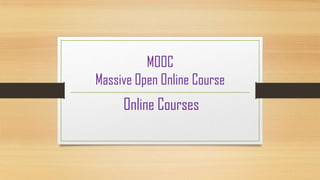Mooc slides
- 1. MOOC Massive Open Online Course Online Courses
- 2. Introduction • Mooc is an online course which is well based on course that aimed at large scale participation and is provided on an open access basis, • Mooc is also aimed at unlimited participation and open access online or via web, addition Mooc is a traditionally course material such as video,readings and solving problem. • It quit give the interaction of users for that certain community,students,professor and teaching assistant. mooc creates flexibility in learning online.
- 3. Importance of Mooc as an online course • • • • • It has an impact on the way faculty or departments structures and deliver courses. It is self-directed student(effective). It is mostly concern about completion rate online. Mooc is essential because it is another way new way of approaching pedagogy. Mooc is raising the level of competition too high for some schools to survive in learning process. • Online become so affordable that there is far less need to go to the campus to get information,Meaning online course can occur everywhere anytime.
- 4. Mooc everywhere and it’s causes un-attendance of students
- 5. Pros & Cons of Mooc. • Pros. • Students pay about 10 percent of what they would for a hands-on lecture or an online course instructed by a faculty member from the university • Online courses it offers a more flexible schedule or is less expensive. • The courses offered are in a wide range of subjects. • Cons. • Less attendance. • Not effective to people who cannot afford internet daily basis. • Too much competition between industries. • Un-reliable information.
- 7. What I learnt in Mooc. • I learnt about MOOCs (Massive Open Online Courses) thanks to a friend’s post on Facebook about Coursera a year ago. I was intrigued and excited. I signed up for several courses, then gave up. Today, after several attempts I finished my first Coursera course — Online Games: Literature, New Media, and Narrative . • MOOC change the world, Well, it already did. I would never attend such course if it weren’t for MOOC. While this is not probably world changing situation, it may be for someone, somewhere.
- 8. Mooc usage in different structure. Mooc it’s an online course that is used worldwide, used by different people with different purposes, the graph left it’s show the percentage of usage in different structures, Mooc is an online that anyone can log/ have access in it.
- 9. Field of interest • One may question if MOOC equals studying in a class with live teacher. While some experienced close contact with their instructor during their studies, some my classes at technical university looked like very low-tech MOOC . • lecture full of students, where the only (if any) personal interaction with the professor would be during scoring of your final exam. I must admit, especially when it came to Inorganic chemistry I didn’t particularly mind. • On the other hand, some lectures were more a discussion with the teacher in small classes. So my own answer is — it all depends what you are studying. I suspect my course of choice would be probably more interactive live.
- 10. History of Mooc • Mooc was emerged from(OER), Mooc was created in university of Edward it was build for the purpose of word where coloration of information can be attained, learners and lectures are engaged with this online courses
- 11. Topic pursue in future via Mooc • Natural Science for grade 8 and 9 basically for intermediate because learners are engaged with technology. • Biology, (DNA,RNA and Human Evolution) this are topic need to be pursed in future because there is evolution in technology.











